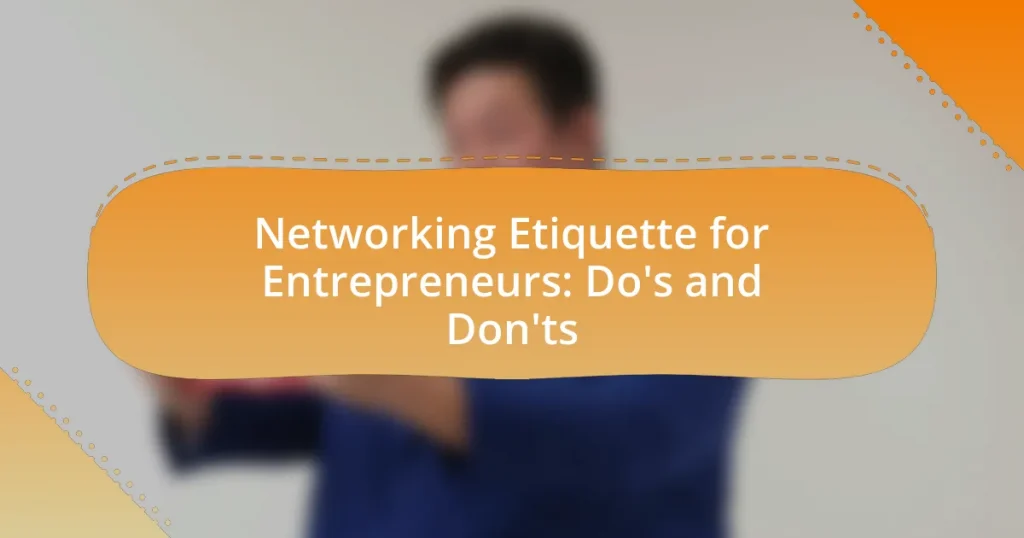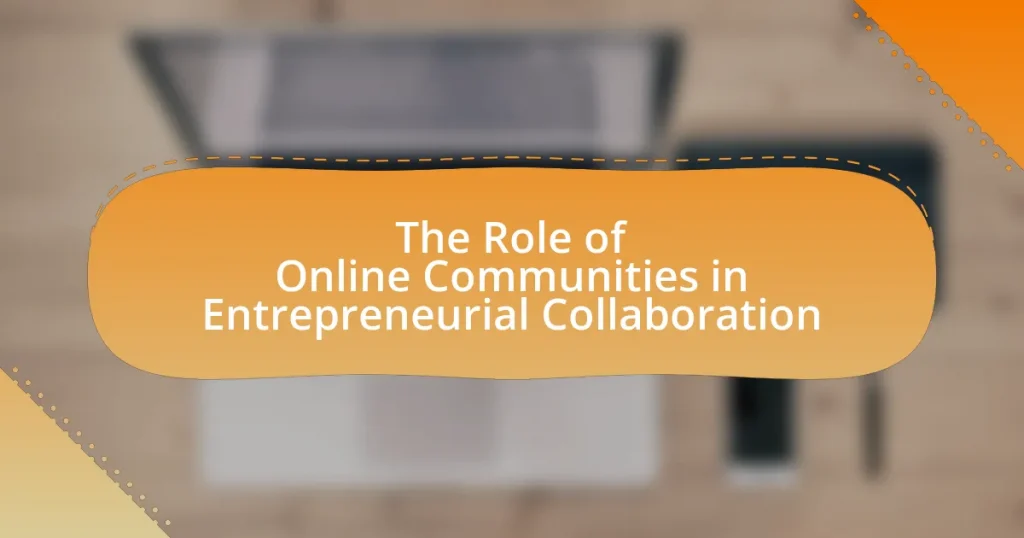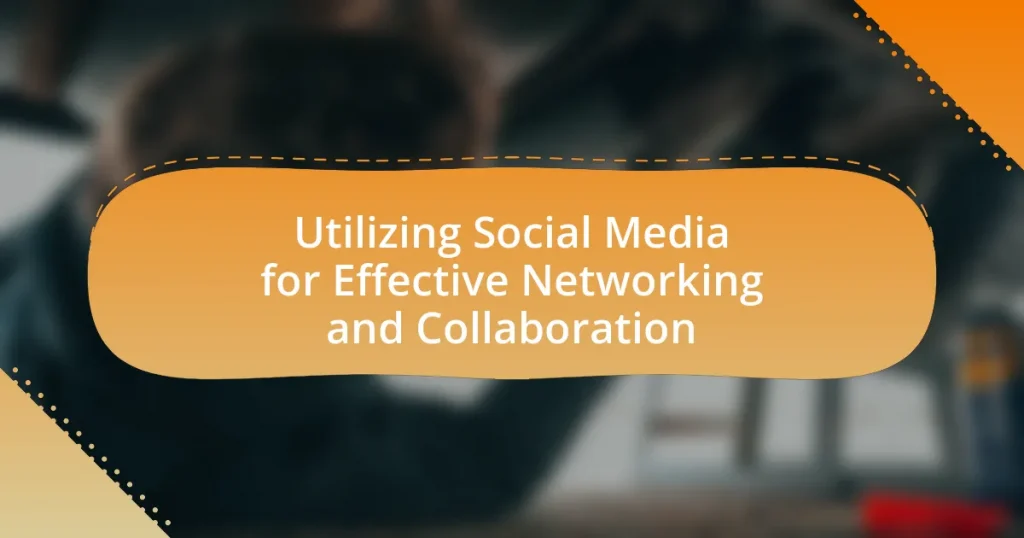Networking etiquette for entrepreneurs is essential for establishing and maintaining professional relationships. This article outlines the importance of professionalism, respect, and authenticity in networking interactions, emphasizing key principles such as active listening, timely follow-ups, and respectful communication. It also highlights common mistakes to avoid, including excessive self-promotion and neglecting to follow up, which can damage relationships and hinder opportunities. Additionally, practical tips for improving networking skills and fostering genuine connections are provided, underscoring the significant impact of effective networking etiquette on business success.

What is Networking Etiquette for Entrepreneurs?
Networking etiquette for entrepreneurs involves maintaining professionalism, respect, and authenticity in interactions. Entrepreneurs should prioritize active listening, ensuring they engage meaningfully with others, and follow up promptly after meetings to reinforce connections. Additionally, they should be mindful of their body language and maintain a positive demeanor, as these non-verbal cues significantly impact perceptions. According to a study by the Harvard Business Review, effective networking can lead to increased opportunities and collaborations, highlighting the importance of etiquette in building lasting professional relationships.
Why is Networking Etiquette Important for Entrepreneurs?
Networking etiquette is crucial for entrepreneurs because it fosters positive relationships and enhances professional reputation. Proper etiquette, such as timely follow-ups and respectful communication, helps entrepreneurs build trust and credibility within their networks. According to a study by the Harvard Business Review, effective networking can lead to increased business opportunities and partnerships, demonstrating that etiquette directly impacts success. By adhering to networking etiquette, entrepreneurs can create lasting connections that are essential for growth and collaboration in their industries.
How does Networking Etiquette impact business relationships?
Networking etiquette significantly impacts business relationships by establishing trust and professionalism. Adhering to proper etiquette, such as timely follow-ups and respectful communication, fosters positive impressions and encourages collaboration. Research indicates that 85% of jobs are filled through networking, highlighting the importance of maintaining good relationships through etiquette. Furthermore, a study by the Harvard Business Review found that effective networking can lead to increased opportunities and partnerships, reinforcing the idea that etiquette plays a crucial role in the success of business interactions.
What are the consequences of poor Networking Etiquette?
Poor networking etiquette can lead to significant negative consequences, including damaged professional relationships and lost opportunities. When individuals fail to adhere to basic networking norms, such as not following up after meetings or being disrespectful during conversations, they risk alienating potential collaborators, mentors, or clients. Research indicates that 70% of jobs are found through networking, highlighting the importance of maintaining positive interactions. Additionally, poor etiquette can result in a tarnished reputation within professional circles, making it difficult to establish trust and credibility. This can ultimately hinder career advancement and limit access to valuable resources and information.
What are the Key Principles of Networking Etiquette?
The key principles of networking etiquette include being respectful, maintaining professionalism, and fostering genuine connections. Respectful behavior involves listening actively and valuing others’ opinions, which enhances mutual understanding. Professionalism is demonstrated through appropriate attire, punctuality, and clear communication, establishing credibility and trustworthiness. Fostering genuine connections requires authenticity and follow-up, as building relationships is essential for effective networking. These principles are supported by research indicating that strong interpersonal skills significantly improve networking outcomes, as highlighted in studies on professional relationship-building.
How can entrepreneurs effectively introduce themselves?
Entrepreneurs can effectively introduce themselves by clearly stating their name, their business, and a concise description of what their business does. This approach allows for immediate recognition and understanding of their professional identity. For instance, an entrepreneur might say, “I am Jane Doe, the founder of EcoTech Solutions, where we develop sustainable energy products.” This format not only establishes their identity but also provides context about their work, making it easier for others to engage in meaningful conversation. Research indicates that clear and structured introductions enhance networking effectiveness, as they facilitate better recall and connection among peers.
What role does active listening play in Networking Etiquette?
Active listening is crucial in networking etiquette as it fosters genuine connections and enhances communication. By fully engaging with the speaker, individuals demonstrate respect and interest, which can lead to stronger professional relationships. Research indicates that effective communication, including active listening, can improve collaboration and trust among network members, ultimately benefiting entrepreneurial endeavors.
What are Common Networking Etiquette Mistakes to Avoid?
Common networking etiquette mistakes to avoid include failing to follow up after initial meetings, neglecting to listen actively, and being overly self-promotional. Following up is crucial as it reinforces connections; studies show that 80% of sales require five follow-ups after the initial meeting. Active listening fosters genuine relationships, while excessive self-promotion can alienate potential contacts, as networking is about mutual benefit rather than one-sided gain.
Why is it important to avoid interrupting others during conversations?
Avoiding interruptions during conversations is crucial for effective communication and relationship building. When individuals refrain from interrupting, they demonstrate respect for the speaker, which fosters a positive environment conducive to open dialogue. Research indicates that active listening, which includes not interrupting, enhances understanding and retention of information, leading to more productive interactions. According to a study published in the Journal of Applied Psychology, effective communication is linked to higher levels of trust and collaboration among team members, underscoring the importance of allowing others to express their thoughts fully without disruption.
How can over-promoting oneself damage networking opportunities?
Over-promoting oneself can damage networking opportunities by creating a perception of insincerity and self-centeredness. When individuals excessively highlight their achievements or capabilities, they risk alienating potential connections who may view them as lacking humility or genuine interest in others. Research indicates that effective networking relies on mutual benefit and relationship-building; thus, an overemphasis on self-promotion can lead to missed opportunities for collaboration and support. For instance, a study published in the Journal of Business and Psychology found that individuals who engage in balanced self-promotion are more likely to foster positive relationships compared to those who excessively promote themselves.

How Can Entrepreneurs Improve Their Networking Etiquette?
Entrepreneurs can improve their networking etiquette by actively listening and engaging in meaningful conversations. Active listening demonstrates respect and interest, which fosters stronger connections. According to a study published in the Journal of Business Communication, effective listening skills can enhance relationship-building and lead to more successful networking outcomes. Additionally, entrepreneurs should follow up with contacts after meetings, as this reinforces connections and shows appreciation for the interaction.
What Strategies Can Entrepreneurs Use to Enhance Their Networking Skills?
Entrepreneurs can enhance their networking skills by actively participating in industry events, utilizing social media platforms for professional connections, and practicing effective communication techniques. Engaging in industry events, such as conferences and workshops, allows entrepreneurs to meet potential collaborators and clients, fostering relationships that can lead to business opportunities. Research indicates that 85% of jobs are filled through networking, highlighting the importance of building a strong professional network. Additionally, leveraging platforms like LinkedIn enables entrepreneurs to connect with industry leaders and share insights, further expanding their reach. Effective communication, including active listening and clear articulation of ideas, is crucial for making lasting impressions and establishing rapport.
How can entrepreneurs prepare for networking events?
Entrepreneurs can prepare for networking events by researching attendees and creating a clear elevator pitch. Researching attendees allows entrepreneurs to identify potential connections and tailor their conversations, while a well-crafted elevator pitch succinctly communicates their business value and goals. According to a study by the Harvard Business Review, effective networking can lead to increased opportunities and partnerships, highlighting the importance of preparation in maximizing the benefits of networking events.
What follow-up practices should entrepreneurs adopt after networking?
Entrepreneurs should adopt timely and personalized follow-up practices after networking to strengthen connections. This includes sending a thank-you email within 24 to 48 hours, referencing specific topics discussed to demonstrate attentiveness, and offering assistance or resources that may benefit the contact. Research indicates that timely follow-ups can increase the likelihood of establishing a meaningful relationship, as 80% of sales require five follow-ups after the initial meeting. Additionally, maintaining regular communication through updates or sharing relevant articles can further solidify the relationship over time.
How Can Entrepreneurs Build Meaningful Connections?
Entrepreneurs can build meaningful connections by actively engaging in networking opportunities and fostering genuine relationships. This involves attending industry events, participating in workshops, and utilizing social media platforms to connect with peers and mentors. Research indicates that 85% of jobs are filled through networking, highlighting the importance of building a robust professional network. Additionally, entrepreneurs should focus on listening and providing value to others, as reciprocity strengthens relationships and encourages collaboration.
What techniques can be used to foster genuine relationships?
To foster genuine relationships, active listening and authentic communication are essential techniques. Active listening involves fully concentrating on the speaker, understanding their message, and responding thoughtfully, which builds trust and rapport. Authentic communication requires honesty and vulnerability, allowing individuals to connect on a deeper level. Research indicates that relationships characterized by open communication and mutual respect lead to higher satisfaction and longevity, as highlighted in the Journal of Social and Personal Relationships, which emphasizes the importance of these techniques in relationship-building.
How can entrepreneurs leverage social media for networking?
Entrepreneurs can leverage social media for networking by actively engaging with industry peers and potential clients through platforms like LinkedIn, Twitter, and Facebook. By sharing valuable content, participating in discussions, and joining relevant groups, entrepreneurs can build relationships and establish their expertise. Research indicates that 70% of professionals have successfully used social media to enhance their networking efforts, demonstrating its effectiveness in creating connections and opportunities.
What are the Do’s and Don’ts of Networking Etiquette?
The Do’s of networking etiquette include being polite, actively listening, and following up after meetings. Politeness fosters a positive atmosphere, while active listening demonstrates respect and interest in others’ perspectives. Following up reinforces connections and shows appreciation for the time spent together.
The Don’ts of networking etiquette involve avoiding self-promotion, interrupting others, and neglecting to respect personal boundaries. Self-promotion can alienate potential contacts, while interrupting disrupts the flow of conversation and can be perceived as disrespectful. Ignoring personal boundaries may make others uncomfortable and damage relationships.
What are the Essential Do’s for Effective Networking?
The essential do’s for effective networking include actively listening, following up promptly, and being genuine in interactions. Actively listening allows individuals to understand others’ needs and interests, fostering stronger connections. Following up promptly after initial meetings demonstrates professionalism and interest, which can lead to lasting relationships. Being genuine in interactions builds trust and encourages open communication, essential components of successful networking. These practices are supported by research indicating that effective networking significantly enhances professional opportunities and collaboration.
How should entrepreneurs approach networking with a positive mindset?
Entrepreneurs should approach networking with a positive mindset by focusing on building genuine relationships rather than merely seeking transactional benefits. This mindset fosters trust and encourages open communication, which are essential for successful networking. Research indicates that positive interactions lead to stronger connections; for instance, a study published in the Journal of Business and Psychology found that positive emotional exchanges significantly enhance networking outcomes. By prioritizing authenticity and mutual support, entrepreneurs can create a more effective and enriching networking experience.
What are the best practices for exchanging contact information?
The best practices for exchanging contact information include being clear, concise, and respectful. When initiating the exchange, state your name and purpose for connecting, ensuring the other party understands the context. Use business cards or digital tools like LinkedIn to facilitate the process, as these methods provide professional presentation and easy access. Additionally, confirm the accuracy of the information exchanged by repeating it back to the other person, which minimizes errors. According to a study by the University of Southern California, effective networking can lead to a 70% increase in business opportunities, highlighting the importance of proper contact exchange.
What are the Critical Don’ts to Remember in Networking?
The critical don’ts to remember in networking include avoiding self-promotion, neglecting follow-up, and failing to listen actively. Self-promotion can alienate potential connections, as studies show that networking is more effective when focused on building relationships rather than pushing personal agendas. Neglecting follow-up can lead to missed opportunities; research indicates that 80% of sales require five follow-ups after the initial contact, highlighting the importance of maintaining communication. Lastly, failing to listen actively can hinder relationship-building, as effective networking relies on understanding others’ needs and perspectives.
Why should entrepreneurs avoid being overly aggressive in their networking approach?
Entrepreneurs should avoid being overly aggressive in their networking approach because it can lead to negative perceptions and damage relationships. Aggressive networking often comes across as insincere or self-serving, which can alienate potential contacts. Research indicates that 70% of professionals prefer a more genuine and collaborative approach to networking, as highlighted in a study by the Harvard Business Review. This preference underscores the importance of building trust and rapport, which are essential for long-term business relationships. Therefore, a balanced and respectful networking strategy is crucial for entrepreneurs to foster meaningful connections.
How can neglecting to follow up harm networking efforts?
Neglecting to follow up can significantly harm networking efforts by creating a perception of disinterest or unreliability. When entrepreneurs fail to follow up after initial meetings or introductions, they risk losing valuable connections and opportunities for collaboration. Research indicates that 80% of sales require five follow-up calls after the meeting, yet many professionals stop after just one. This statistic highlights the importance of persistence in networking. Without follow-up, relationships may stagnate, and potential partnerships or referrals can be lost, ultimately hindering business growth and success.
What Practical Tips Can Entrepreneurs Implement for Successful Networking?
Entrepreneurs can implement several practical tips for successful networking, including actively listening, following up promptly, and being authentic in interactions. Active listening fosters genuine connections, as it demonstrates interest and respect for others’ perspectives. Following up within 24 to 48 hours after meeting someone helps reinforce the relationship and keeps the conversation alive. Authenticity builds trust, which is essential for long-term networking success. According to a study by the Harvard Business Review, strong relationships are built on trust and mutual respect, highlighting the importance of these practices in effective networking.



